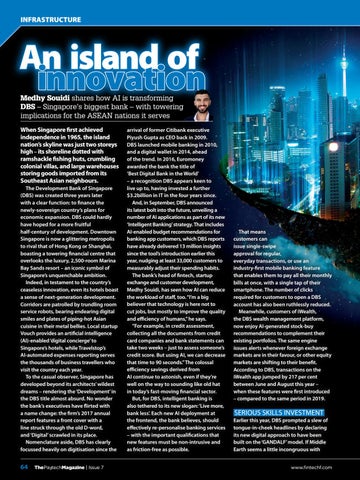INFRASTRUCTURE
An island of innovation Medhy Souidi shares how AI is transforming DBS – Singapore’s biggest bank – with towering implications for the ASEAN nations it serves
When Singapore first achieved independence in 1965, the island nation’s skyline was just two storeys high – its shoreline dotted with ramshackle fishing huts, crumbling colonial villas, and large warehouses storing goods imported from its Southeast Asian neighbours. The Development Bank of Singapore (DBS) was created three years later with a clear function: to finance the newly-sovereign country’s plans for economic expansion. DBS could hardly have hoped for a more fruitful half-century of development. Downtown Singapore is now a glittering metropolis to rival that of Hong Kong or Shanghai, boasting a towering financial centre that overlooks the luxury, 2,500-room Marina Bay Sands resort – an iconic symbol of Singapore’s unquenchable ambition. Indeed, in testament to the country’s ceaseless innovation, even its hotels boast a sense of next-generation development. Corridors are patrolled by trundling room service robots, bearing endearing digital smiles and plates of piping-hot Asian cuisine in their metal bellies. Local startup Vouch provides an artificial intelligence (AI)-enabled ‘digital concierge’ to Singapore’s hotels, while Travelstop’s AI-automated expenses reporting serves the thousands of business travellers who visit the country each year. To the casual observer, Singapore has developed beyond its architects’ wildest dreams – rendering the ‘Development’ in the DBS title almost absurd. No wonder the bank’s executives have flirted with a name change: the firm’s 2017 annual report features a front cover with a line struck through the old D-word, and ‘Digital’ scrawled in its place. Nomenclature aside, DBS has clearly focussed heavily on digitisation since the
64
ThePaytechMagazine | Issue 7
arrival of former Citibank executive Piyush Gupta as CEO back in 2009. DBS launched mobile banking in 2010, and a digital wallet in 2014, ahead of the trend. In 2016, Euromoney awarded the bank the title of ‘Best Digital Bank in the World’ – a recognition DBS appears keen to live up to, having invested a further $3.2billion in IT in the four years since. And, in September, DBS announced its latest bolt into the future, unveiling a number of AI applications as part of its new ‘Intelligent Banking’ strategy. That includes AI-enabled budget recommendations for banking app customers, which DBS reports have already delivered 13 million insights since the tool’s introduction earlier this year, nudging at least 33,000 customers to measurably adjust their spending habits. The bank’s head of fintech, startup exchange and customer development, Medhy Souidi, has seen how AI can reduce the workload of staff, too. “I’m a big believer that technology is here not to cut jobs, but mostly to improve the quality and efficiency of humans,” he says. “For example, in credit assessment, collecting all the documents from credit card companies and bank statements can take two weeks – just to assess someone’s credit score. But using AI, we can decrease that time to 90 seconds.” The colossal efficiency savings derived from AI continue to astonish, even if they’re well on the way to sounding like old hat in today’s fast-moving financial sector. But, for DBS, intelligent banking is also tethered to its new slogan: ‘Live more, bank less’. Each new AI deployment at the frontend, the bank believes, should effectively re-personalise banking services – with the important qualifications that new features must be non-intrusive and as friction-free as possible.
That means customers can issue single-swipe approval for regular, everyday transactions, or use an industry-first mobile banking feature that enables them to pay all their monthly bills at once, with a single tap of their smartphone. The number of clicks required for customers to open a DBS account has also been ruthlessly reduced. Meanwhile, customers of iWealth, the DBS wealth management platform, now enjoy AI-generated stock-buy recommendations to complement their existing portfolios. The same engine issues alerts whenever foreign exchange markets are in their favour, or other equity markets are shifting to their benefit. According to DBS, transactions on the iWealth app jumped by 217 per cent between June and August this year – when these features were first introduced – compared to the same period in 2019.
SERIOUS SKILLS INVESTMENT Earlier this year, DBS prompted a slew of tongue-in-cheek headlines by declaring its new digital approach to have been built on the ‘GANDALF’ model. If Middle Earth seems a little incongruous with www.fintechf.com
